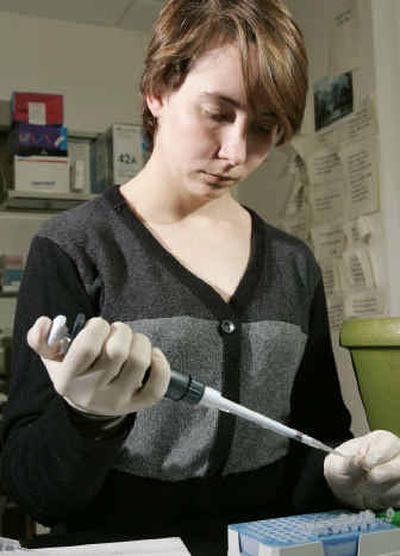Federal trial set next week over pipette

MADISON, Wis. — A federal trial is scheduled next week involving major makers of scientific equipment, the University of Wisconsin and an entrepreneur, all over who can profit from a device most people know from high school chemistry.
At stake is millions of dollars in U.S. sales of the adjustable pipette, the syringe-like instrument that researchers around the world use to measure and transfer liquids from one container to another.
Inventor Warren Gilson created the instrument in 1972, and since then his company, medical instrument maker Gilson Inc., has had an agreement allowing Rainin Instrument Co. of Woburn, Mass. to exclusively buy and sell it in the United States. For 30 years, the two companies have teamed up to supply laboratories around the world with the devices, which allow researchers to suck up and spit out precise amounts of liquids into a tube at the push of a button.
But Gilson claims that Rainin executives waged a campaign to disparage Gilson’s Pipetman products and route customers to their own competing product lines, introduced after the 1974 patent expired in 1991. Gilson blames the drive for a significant drop in sales of pipettes to U.S. customers, and is seeking to break the sales contract with Rainin and recoup more than $8 million in lost profits and royalties.
The lawsuit also names Rainin’s parent company, lab instrument company Mettler-Toledo of Ohio, which warned investors in a February filing with the Securities and Exchange Commission that losing the agreement would cost it $19.9 million.
The downturn in sales also means less money for research at the University of Wisconsin, which gets $4.25 in royalties on every Gilson pipette sold, thanks to a gift from Warren Gilson, who died in 2002. Even in a year with slow sales, that can net the university more than $200,000.
Trial is scheduled for May 31 at the U.S. District Court for the Western District of Wisconsin in Madison.
Gilson’s 1972 invention made the pipettes adjustable, allowing one tool to be used for many different sizes of measurements, instead of having to use dozens of them. And instead of using a long glass tube, researchers could simply push a button to take in and discharge the liquid.
“It made the researchers’ life easier because it took a task that had been drudgery and it made it fast and easy and reliable,” said Robert Gilson, chairman and president of Gilson Inc. and son of the inventor. The younger Gilson himself had a role in the invention, designing the instrument so it could be hand-held.
The invention cut three-quarters of the time that scientists spent measuring and transferring liquids, said Henry Lardy, a UW-Madison professor emeritus of biochemistry.
“With the Gilson pipette, you could just hit that button and you got the right amount, clicked the button again and it discharged the volume that you had,” said Lardy, who was among the first users of the invention. “It was much, much faster.”
But fewer pipettes are carrying the Gilson name. In 2004, Rainin’s pipette products increased their share of the U.S. market by 25 percent, selling 30,000 in all, according to court documents. Meanwhile, Gilson pipettes declined in annual sales to 50,000 in 2004 from 80,000 in 2001.
Gilson argues that was the result of a campaign by Rainin to portray Rainin’s competing lines as superior, offer customers discounts for switching brands and reward its sales force with higher commissions and bonuses for enticing customers to buy Rainin products.
Rainin denied in court filings that it waged any campaign of the sort, and claimed that sales of Gilson pipettes dropped because of a market downturn after Sept. 11, 2001. Rainin claims the evidence at most shows a collection of isolated incidents by its salespeople that do not amount to a breach of contract.
The company has filed a counterclaim against Gilson, seeking more than $1 million in damages for its refusal to turn over technical information it is required to divulge under the contract.